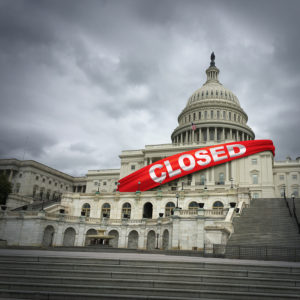The partial government shutdown is leaving 800,000 federal employees unpaid. In a society where civil-military relations are increasingly strained, this issue has laid bare a bigger issue: As a nation, we revere military service while discounting the service of federal workers.
Federal workers are no less servants of the nation just because they don’t wear a uniform. They take an oath to the nation just like the military. They’re merely serving in a different capacity, often in occupations that go unnoticed until a shutdown puts a pause on their work — and the current shutdown brings into focus the vastly different values we place on these types of service.
We are all thankful for the service of the military, but we must also recognize those who keep us safe on any given day. All across the country, TSA agents are ensuring our flights will be safe, and USDA food inspectors ensure we are eating safe food. Meanwhile, Customs and Border Patrol agents secure our borders, protect our ports of entry, and monitor our immigration system — all jobs made more difficult by the partial government shutdown and, ironically, proposed to be solved by the military’s construction of a wall.
To many, the military has become the first resort to solving problems we face as a nation, largely by grace of its specialized skill and efficiency. Although while its work is more visible, it is not necessarily more impactful, as the shutdown is bringing into stark reality.
Contrary to popular belief, the federal government is not limited to Washington. Federal employees are spread out in cities across the nation, and Americans are arguably more likely to encounter — and be directly helped — by a federal employee than a military member. However, we’ll blindly support military members without appreciating the efforts of civil servants.
Adding another wrinkle to this divide between views of the military and federal employees is the fact that nearly a third of the federal workforce are veterans of the armed forces. Why, then, is their continued service any less valued when they’re out of uniform? The difference widens the civil-military divide.
The military serves to protect the United States and our interests. And it fills a unique role to that end by employing force and influence to protect and promote national security. But service members do this in concert with, and arguably in large part supported by, the efforts of our country’s civil servants.
Society praises the military for its work in providing security, yet downplays the importance of the federal worker who most directly affects our daily safety. The shutdown, for instance, currently puts us at risk by not paying TSA employees.
This is not to mention the countless other ways the shutdown is affecting America as a whole by keeping civil servants from performing their regular duties: the FBI agents investigating and prosecuting domestic crimes, the CIA officers protecting us from foreign adversaries, and the numerous employees processing our tax returns, protecting our national parks, and conducting all matter of routine business. Those who elevate the military to such high status state that their service is required to protect our great nation. But the federal employee, so often forgotten, makes up the very government that the military is protecting.
While the visible day-to-day need for federal workers becomes more evident by the day, the unseen effects of this dynamic will continue to spread. A shutdown preventing military pay would have been over within a few short days after public outrage and calls for taking care of those who defend us. We saw this very scenario play out in January 2018 after three days of a complete shutdown. Instead, we find ourselves on month into a partial shutdown (that is supposedly about security to begin with) that makes many aspects of our lives less safe and has made public servants unwitting, unpaid political pawns.
This shutdown has exposed our society’s values of service. Like service members, federal employees have committed to serve in support of their fellow citizens. And in reality, the two types of service are vital to each other. The military operates in defense of the federal government, and the federal government in turn ensures the daily operation of all these protected government functions. Narrowing this gap is key to effective military operations, and proper civilian oversight of them. More important, it is imperative to a properly functioning government, as well as to the recruitment, retention,and care of patriotic federal employees.

